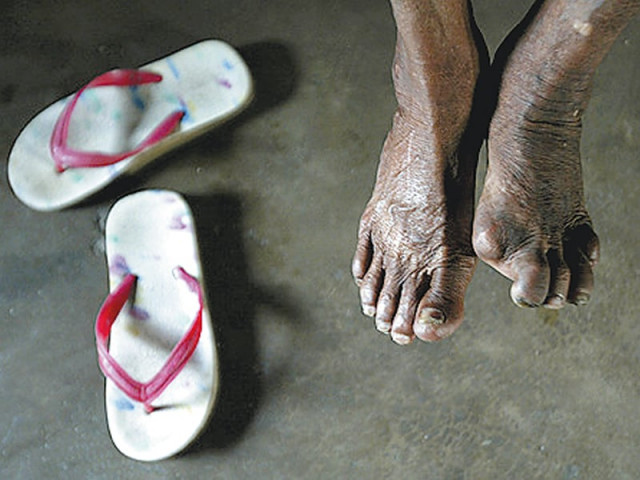Hansen’s disease: A synonym for stigma
In the last six months, more than 33 cases of leprosy were registered in K-P.

Only 16 countries account for 95% of new cases that are detected worldwide. Sixteen million leprosy patients have been completely cured in the past three decades. PHOTO: REUTERS
Bacha Meena was only 10-years-old when her parents were diagnosed with leprosy. They passed away a few years later. Today, at 45, she is one of the 20 leprosy patients admitted at the Leprosy Treatment Unit at Lady Reading Hospital (LRH) in Peshawar.
Originally from Niyak Dara in Upper Dir, Meena and her family were forced to leave their hometown and relocate to Charsadda district in 1998. She was 18-years-old when the doctors diagnosed her with the disease.

Meena still remembers the day she lost feeling in her hands and feet. “I used to take care of my parents when they had leprosy. They were unable to walk and could not eat properly. Their fingers, toes and noses rotted away; now I have no fingers or toes either.”
Leprosy, also known as Hansen’s disease, is a bacteria which damages the peripheral nerves, resulting in loss of sensation in the area. If left untreated or not caught in time, the surrounding muscles waste away causing disfiguration of the body.
Due to lack of awareness or proper treatment, Meena’s parents died a few years after they contracted the illness. She says she did not know much about it either till the doctors explained it to her.
For Meena, getting better means being able to help other leprosy patients at the centre. After spending 10 years at the centre, she does not want to go live with her siblings.
“My treatment is almost complete,” she said with a hint of a smile, “I do not want to be a burden on my brothers. They are living happily and I do not want to disrupt their lives. This centre is my home now and I want to spend my life taking care of other leprosy patients.”
Meena isn’t alone, around 19 other lepers left their families and homes to live at the unit. Despite the daily hardships they face, most of them complain of only one thing - that they are never visited by their loved ones.
Father of five, Gul Nawab Khan, is from Upper Dir and was diagnosed with leprosy 20 years ago. According to the 70-year-old, his family and friends haven’t visited him in the three months he has been at the hospital as they are afraid of the disease.
Leprosy and Pakistan
In 1995, the World Health Organization (WHO) estimated that between two to three million people were permanently disabled because of leprosy in Pakistan.

In the last 20 years, 15 million people worldwide have been cured of the crippling disease. Contrary to popular belief leprosy is treatable. It may be passed on by close and repeated contact with someone who is untreated. According to Leprosy Field Officer Khyber-Pakhtunkhwa, Murad Ali, 33 cases of leprosy have been registered in the province in the past six months.
“Since 1965, around 7,221 leprosy cases have been reported in Khyber-Pakhtunkhwa (K-P),” he said. “Almost 75% of the cases come from a community already infected with the disease, while the remaining are from an environment where the bacterium is circulating.” He added that there were a total of 31 leprosy treatment centres actively working in K-P. These centres are funded by the German government, while the medicines are provided by WHO.
Ali said that depending on the extent of the disease, the complete treatment of a leper takes six months to two years; however, patients have shown signs of the disease even after 20 years.
Other countries with a significant number of leprosy cases include India, Indonesia and Brazil.
Published in The Express Tribune, December 21st, 2013.













COMMENTS
Comments are moderated and generally will be posted if they are on-topic and not abusive.
For more information, please see our Comments FAQ